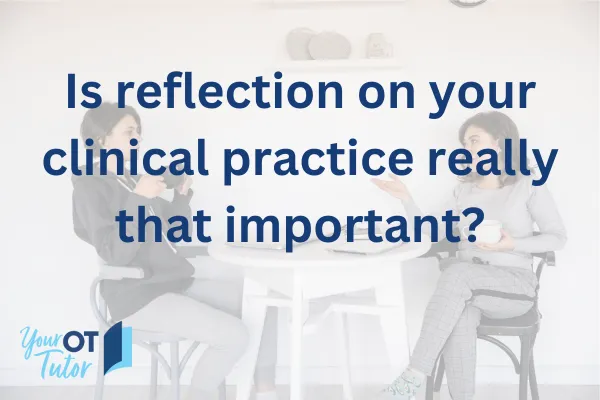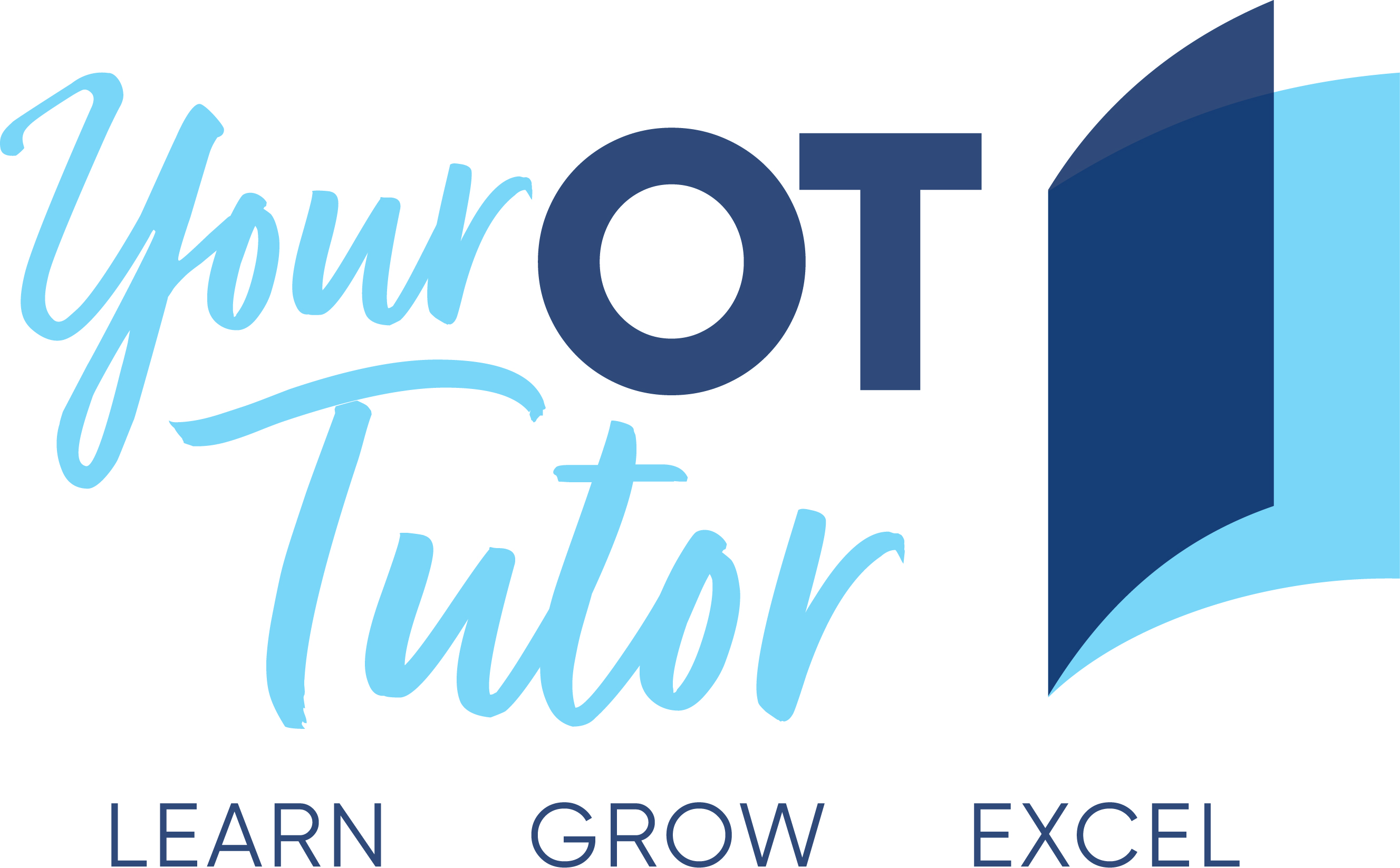THE YOUR OT TUTOR BLOG
Articles on important topics for occupational therapists...

Is reflection on your clinical practice really that important?
From the first year of uni we hear about the importance of reflective practice as occupational therapists. Over the course of our degree it will feel like every second assignment asks you to reflect, and you’ll probably do it so much that you’re mumbling about the Gibbs reflective cycle in your sleep. But then you go out on placement or start working and you don’t really see other OTs doing it in action. So, is it really that important after all?!
Well, yep, sorry – it really is. In this article I’ll talk you through what reflective practice is, why it is important, why it looks like no-one does it once they start working, and how you can make it part of your routine in the least painful way possible.
What is reflective practice?
Reflective practice is a structured process of thinking about and learning from our experiences. It can take many different forms, but often involves stages or a cycle to guide the thought process. Let’s make it easy with an example. Say you saw your client for an upper limb therapy session and it didn’t go well; they weren’t engaged in the session, and you didn’t know how to adapt the activities to allow them to achieve success.
You probably would walk out of a session like that feeling pretty stressed or overwhelmed, but it’s also the perfect opportunity for reflection to help you think about what you actually did, what didn’t go so well, why it didn’t go well, and what do to differently next time. Even though it’s probably very difficult to see, there was probably some good stuff in there too that you did do well that you should acknowledge and build on to continue to improve your clinical practice. The process of thinking about all these things with the intention of critiquing yourself and improving, is reflective practice.
So why is it so important?
There are lots of reasons why reflection is drilled into us at uni – it is essential for our professional development and to ensure we are delivering the best quality clinical services to our clients. It does this by allowing us to be more targeted in what we might decide to learn more about, consult literature about, or what we might change in the future. For the example above, if we just finish the session, say “oh well, that didn’t go well but I’ll do better next time” but don’t develop a plan for what you can practice or change so that the session does go better, it probably won’t.
Reflective practice allows you to reflect on your clinical reasoning – why did you choose that upper limb activity in the first place? Did you have a clear understanding of what was impacting your client’s upper limb function (e.g. weakness, tone, sensation) so you not only had a clear goal in mind but also a plan for how you could adapt it if it was too difficult? Did you put enough effort into planning and setting up the session so you had lots of activity options you were familiar with? This critique of your own reasoning can help you to get the most out of supervision sessions if you were debriefing with your supervisor afterwards, as you’ll have a clearer understanding of what may have been missing in your approach.
If improving your clinical practice and delivering better services to your clients isn’t enough motivation to engage in reflective practice, there is also a pretty big authoritative reason we need to be doing it too. The Occupational Therapy Competency Standards (2018) state that occupational therapists should “reflect on practice,” and AHPRA also requires clinicians to not only complete CPD, but to reflect on how it will improve their clinical practice. So yep, it’s important that you do it.
Why does it look like no-one does it once they start working?
Even though it may look like no-one does much reflection once they’re working, except maybe in the leadup to a supervision session, chances are most OTs are already reflecting, it’s just not in the form of sitting down with a Gibbs cycle written template.
It’s often disguised as something else. It may take the form of talking to themselves on the drive back from a home visit, or of a shared discussion with the team in a case conference, or as a debrief with a colleague over a coffee following that not-so-great upper limb therapy session. In all these circumstances the OT is probably describing what happened in the session, and unpacking all the things that went wrong and why they went wrong, while their peer (if present) is hopefully helping them remember some of the things that did go alright, or that they had improved from last time. Sounds like reflective practice, doesn’t it?
How can I fit in more reflective practice? I’m already way too busy!
Hopefully by now you’ve not only realised that reflective practice is super important, but also that you may already be doing it in some form, you’re just not calling it ‘reflection’ and writing it down in a daily journal using a template you discovered in a textbook.
If you’re reading this and thinking “actually no, I’m not really doing any of those things on a regular basis”, this section of the article may give you some ideas for how you can fit it into your schedule. And if you’re thinking “I’m already way to busy to fit in anything else,” trust me, wasting time repeating the same treatment approaches instead of looking for ways that could be more efficient or effective, is already wasting your time.
Here's some things you could try:
- Find the structure that works for you – you may actually love the Gibbs cycle! If you do, go for it, and use a template to write down your thoughts. For all the new grads and students reading, you may also like to check out the Your OT Tutor reflection template, which gives you lots of prompts for the questions you should be asking yourself until you can remember them on auto-pilot. Or, if you like structure but want something a little simpler, check out Rolfe’s (2021) three questions: What? So what? Now What.
- Think about whether you prefer to write down your reflections, say them out loud but only to yourself, or discuss them with someone else in a conversation. You may have had a chance to try a variety of different formats during your time as a student or OT, so if you’ve found something that worked well for you, don’t tamper with a winning system, find ways to fit it into your schedule.
- I understand ‘finding time’ may not be possible, so instead ‘make time.’ Block out half an hour at the end of each day for admin, and at least once a week, make sure this time is spent on reflection. Or block out 20 minutes of your calendar the day before your supervision session with your clinical supervisor, so you can make the most of this formal learning opportunity.
- If you are a supervisor or manager, please make sure you are building in some time into your clinician’s schedules so they can dedicate the time this important task requires.
Once you’ve made some time for reflection, don’t forget the action plan! Once you’ve thought about what you need to improve, or what you could do differently, make sure you plan how you can do things differently, and often it needs to be more than “just practice”. You might need to do some more joint treatment sessions with your supervisor so your ability to assess upper limb function improves (maybe this is why you weren’t able to adapt the activities). Maybe you need to do some formal workshops on upper limb treatment because you just haven’t been working in the caseload long enough to fully understand the evidence-base behind what you are doing. Or maybe you need to do some peer practice or role play working on your communication strategies, as your decreased confidence in this skill impacted your client’s engagement in the session.
So, in a nutshell – yes reflection is important, and you should do it, but it doesn’t need to be painful or involve a written template all the time. Find a format that works for you, focus on the why (why things didn’t go so well, or why they did go well) and how (how they could be improved), and don’t forget the action plan!
If you found this article helpful, keep following Your OT Tutor – there are more tips, resources, and courses to come!
#OccupationalTherapy #NewGraduate #NDIS #YourOTTutor #Reflection






